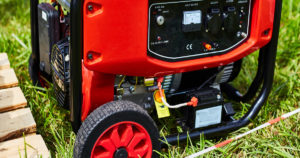Safely Using Portable Generators
October 1, 2020 The Consumer Product Safety Commission (CPSC) wants people to take note: the risks of carbon monoxide poisoning, electrical dangers, and house fires increase after a storm hits. More than 36 million people experience power outages every year, making portable generators a popular choice for powering up their essential appliances while main utility providers are down. Although portable generators are useful, it is critical to operate them safely and responsibly in order to avoid preventable injuries and the risk of death.
The Consumer Product Safety Commission (CPSC) wants people to take note: the risks of carbon monoxide poisoning, electrical dangers, and house fires increase after a storm hits. More than 36 million people experience power outages every year, making portable generators a popular choice for powering up their essential appliances while main utility providers are down. Although portable generators are useful, it is critical to operate them safely and responsibly in order to avoid preventable injuries and the risk of death.
A portable generator provides energy by using an engine to generate electrical power. Some portable generators use liquid propane, while others use diesel fuel or natural gas. The Centers for Disease Control and Prevention (CDC) report that after a natural disaster or other emergency the use of alternative power sources (e.g. portable generators) can result in a hazardous buildup of CO, or carbon monoxide, in a home, camper, or garage. This buildup can lead to the poisoning of humans and animals in these areas. Other risks associated with portable generators include electrical hazards and fires.
Ways to Limit Generator-Related Hazards
Data suggests that the majority of cases of carbon monoxide poisoning and fires occur from the improper use of portable generators. The CPSC and CDC recommend consumers take the following steps to prevent carbon monoxide-related injuries:
- Always read the manufacturer’s instructions and warning labels before using a portable generator
- Never use a portable generator indoors. Use it outside the house and make sure it is at least 20 feet away from the home
- Make sure you have working smoke and carbon monoxide alarms throughout your home. Test alarms frequently to ensure they are in proper working order
- Keep children and pets away from generators and fuel
- Never use a generator inside a garage, crawl space or shed
- If you are using a portable generator and you begin to feel sick, dizzy, and/or weak, get to an area with fresh air immediately. People call carbon monoxide the “Silent Killer,” and it can be deadly within mere minutes
Storing large amounts of gasoline to power up generators can create fire hazards. Why? Because when gasoline is heated, it expands. The fumes from this expansion can ignite with even the smallest spark, so the more gasoline you have stored at your home the greater the likelihood of igniting the fumes. To avoid these hazards, store the smallest amount of gasoline possible to power up your generator in the case of a severe storm or other natural disaster. Other ways to prevent fire hazards include not refueling a generator while it is running or hot and storing fuel in labeled, non-glass containers outside of any living areas and out of the vicinity of all fuel-burning appliances.
When it comes to limiting electrical hazards, consumers can take several steps. The CDC recommends the following tips:
- Do not connect a generator to another power source (like a power line)
- Keep the generator dry and operate it only on a dry surface in an open area
- If your hands are wet, do not touch the generator
- Always check the cord for signs of wear and tear before using the generator
- Give the generator at least 10 seconds to stabilize after start up and before beginning to plug appliances into it
- Do not plug generators into wall outlets
If You Were Injured
Even after taking precautionary measures to avoid preventable injuries, some consumers still get hurt when using a portable generator. Defective machinery injures thousands of consumers every year. Remember, manufacturers, sellers, and suppliers are all legally obligated to produce and sell safe products. All too often, however, companies cut corners to increase their profits no matter how many unsuspecting consumers they endanger by doing so. If a defective product injured you or a loved one, someone at our firm can help. Contact a representative online now.
Philadelphia Products Liability Lawyers at Galfand Berger, LLP Representing Injured Individuals Since 1947
With offices located in Philadelphia, Bethlehem, Lancaster, and Reading, Galfand Berger serve clients throughout Pennsylvania and New Jersey. To schedule a consultation, call us at 800-222-8792 or complete our online contact form.
 Google Screened
Google Screened
